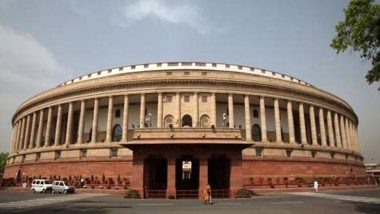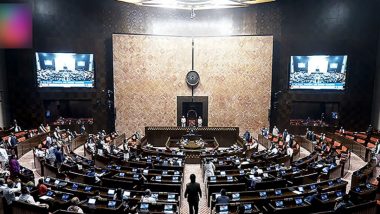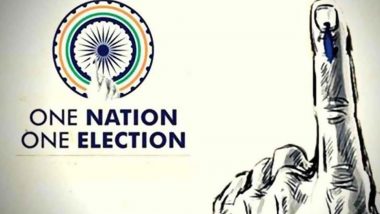New Delhi, September 22: A spree of legislations, including some of the contentious Bills, are being rushed through the Lok Sabha and Rajya Sabha in the special Monsoon Session of Parliament called by the government. On Tuesday, the Centre succeeded in passing seven crucial Bills in the Parliament's Upper House amid Opposition boycott. Here are the basics about a legislation, how they are introduced and how the Legislature clears them. Rajya Sabha Passes 7 Crucial Bills Across Several Key Spectrums Today; Check Full List and Details.
What is a Bill?
A Bill is a draft statute which becomes law after it is passed by both the Houses of Parliament and assented to by the President. All legislative proposals are brought before Parliament in the forms of Bills.
Bills may be broadly classified into Government Bills and Private Members’ Bills depending upon their initiation in the House by a Minister or a Private Member.
Content wise, Bills are further classified into:
- Original Bills which embody new proposals, ideas or policies.
- Amending Bills which seek to modify, amend or revise existing Acts.
- Consolidating Bills which seek to consolidate existing law/enactments on a particular subject.
- Expiring Laws (Continuance) Bills which seek to continue Acts which, otherwise, would expire on a specified date.
- Repealing and amending Bill to cleanse the Statute Book.
- Validating Acts to give validity to certain actions.
- Bills to replace Ordinances.
- Money and Financial Bills, and
- Constitution Amendment Bills.
Procedurally, the Bills are classified as: (i) Ordinary Bills, (ii) Money Bills and Financial Bills, (iii) Ordinance Replacing Bills and (iv) Constitution Amendment Bills.
What Are Money Bills?
Money Bills are those Bills which contain only provisions dealing with all or any of the matters specified in sub-clauses (a) to (f) of clause (1) of article 110 of the Constitution. Financial Bills can be further classified as Financial Bills Categories A and B. Category A Bills contain provisions dealing with any of the matters specified in sub-clauses (a) to (f) of clause (1) of article 110 and other matters and Category B Bills involve expenditure from the Consolidated Fund of India.
How Are Bills Introduced in Parliament?
Except Money Bills and Financial Bills, which can be introduced only in the Lok Sabha, a Bill may originate in either House of Parliament. As per the provisions of article 109 of the Constitution, the Rajya Sabha has limited powers with respect to Money Bills. A Money Bill after having been passed by the Lok Sabha, and sent to Rajya Sabha for its recommendations, has to be returned to Lok Sabha by the Rajya Sabha, with in a period of fourteen days from the date of its receipt, with or without recommendations.
It is open for the Lok Sabha, to either accept or reject all or any of the recommendations of the Rajya Sabha. If the Lok Sabha accepts any of the recommendations of the Rajya Sabha, the Money Bill is deemed to have been passed by both Houses with the amendments recommended by the Rajya Sabha and accepted by the Lok Sabha.
If the Lok Sabha does not accept any of the recommendations of the Rajya Sabha, the Money Bill is deemed to have been passed by both Houses in the form in which it was passed by the Lok Sabha without any of the amendments recommended by the Rajya Sabha.
In case a Money Bill is not returned by the Rajya Sabha to the Lok Sabha within a period of fourteen days from the date of its receipt, it is deemed to have been passed by both Houses in the form in which it was passed by the Lok Sabha after the expiry of said period.
How Is a Bill Enacted Into Law?
(i) A Bill undergoes three readings in each House of Parliament. The First Reading consists of the Introduction of a Bill. The Bill is introduced after adoption of a motion for leave to introduce a Bill in either of the House. With the setting up of the Department-related Parliamentary Standing Committees, invariably all Bills, barring Ordinance replacing Bills; Bills of innocuous nature and Money Bills, are referred to the these Committees for examination and report within three months. The next stage on a Bill i.e., second reading start only after the Committee submits its report on the Bill to the Houses.
The Second Reading consists of two stages: the ‘first stage’ consists of discussion on the principles of the Bill and its provisions generally on any of the following motions: that the Bill be taken into consideration; that the Bill be referred to a Select Committee of the Rajya Sabha ; that the Bill be referred to a Joint Committee of the Houses with the concurrence of the Lok Sabha; that it be circulated for the purpose of eliciting opinion thereon; and the ‘second stage’ signifies the clause-by clause consideration of the Bill as introduced or as reported by the Select/Joint Committee. Amendments given by members to various clauses are moved at this stage.
The Third Reading refers to the discussion on the motion that the Bill (or the Bill as amended) be passed or returned (to the Lok Sabha, in the case of a Money Bill) wherein the arguments are based against or in favour of the Bill. After a Bill has been passed by one House, it is sent to the other House where it goes through the same procedure. However the Bill is not again introduced in the other House, it is laid on the Table of the other House which constitutes its first reading there.
After a Bill has been passed by both Houses, it is presented to the President for his assent. The President can assent or withhold his assent to a Bill or he can return a Bill, other than a Money Bill, for reconsideration. If the Bill is again passed by the Houses, with or without amendment made by the President, he shall not withhold assent there from. But, when a Bill amending the Constitution passed by each House with the requisite majority is presented to the President, he shall give his assent thereto.
A Bill becomes an Act of Parliament after being passed by both the Houses of Parliament and assented to by the President.
(With inputs from Rajyasabha.nic.in)
(The above story first appeared on LatestLY on Sep 22, 2020 07:07 PM IST. For more news and updates on politics, world, sports, entertainment and lifestyle, log on to our website latestly.com).













 Quickly
Quickly




















